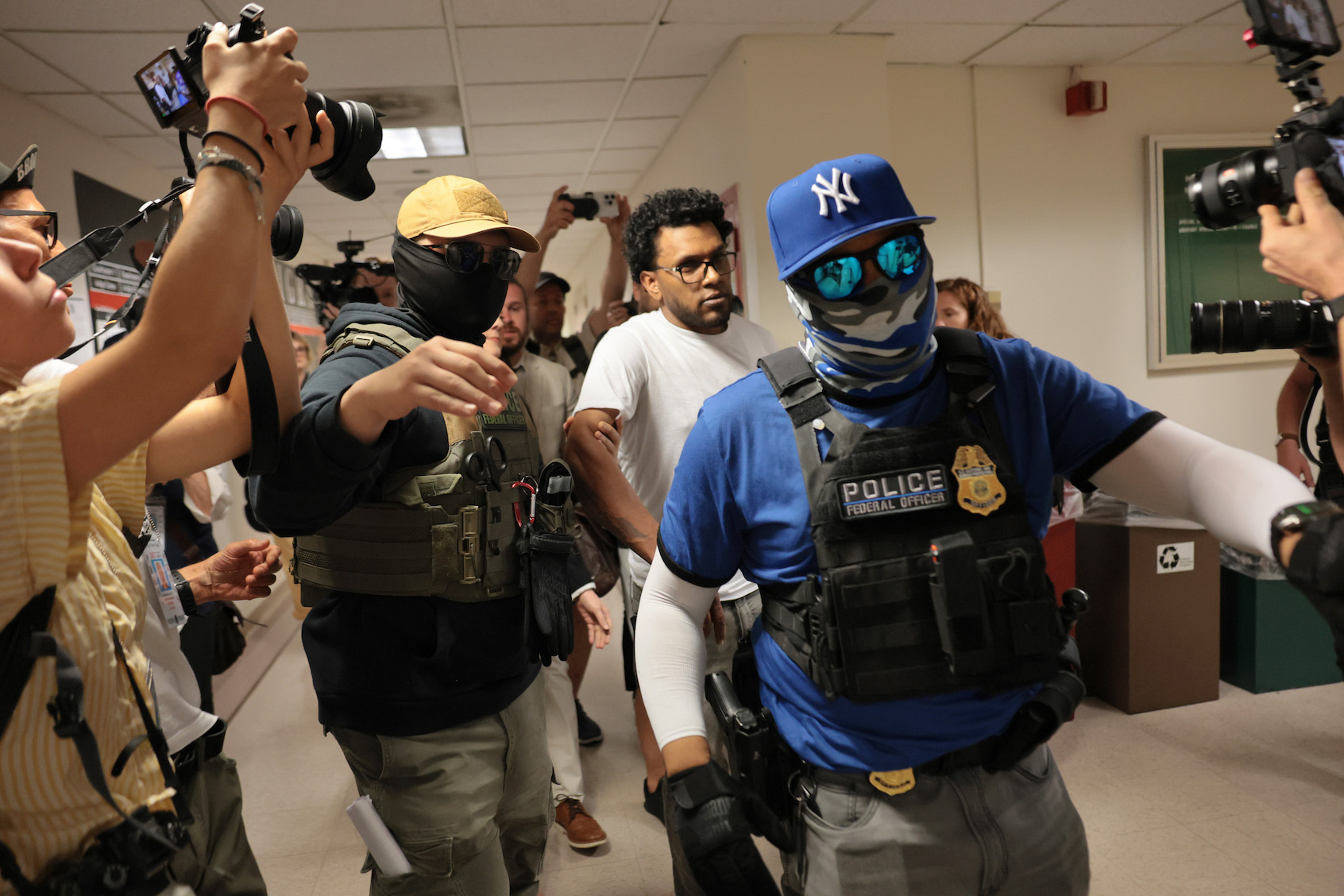Concerns are mounting over the actions of federal immigration agents under the Trump administration, particularly following incidents in cities like Santa Ana, California. In June, residents reported alarming encounters with masked officers, who appeared to be Immigration and Customs Enforcement (ICE) agents, detaining individuals without identifying themselves or displaying proper credentials. The situation escalated to the point where some residents described the actions they witnessed as kidnappings, prompting urgent calls to local authorities.
Recordings obtained by ProPublica illustrate the panic experienced by Santa Ana residents as they observed masked men forcibly taking people from public spaces. One caller described a scene in which a person was beaten before being loaded into a vehicle that bore no identifying markings. Another resident raised concerns about the unmarked vehicles, asking, “What kind of police go around without license plates?” These reports prompted a tense public meeting where Mayor Valerie Amezcua and city officials expressed their frustrations over the limitations in addressing the federal agents’ actions.
The situation in Santa Ana has become emblematic of a larger trend across the United States, where federal agents operate with increasing autonomy and reduced oversight. Mayor Amezcua noted that federal enforcement tactics seem to be tested in smaller cities before being expanded to larger operations in metropolitan areas. “It’s almost like he tries it out in this county and says, ‘It worked there, so now let me send them there,’” Amezcua remarked, highlighting the broader implications of these tactics.
Concerns about accountability for federal agents have been echoed by current and former national security officials. They argue that the actions of ICE represent a significant shift in the United States’ approach to law enforcement, likening it to practices seen in repressive regimes. These officials note that the Trump administration has dismantled many of the civil rights protections that once governed federal immigration enforcement, fostering an environment where unchecked authority can lead to abuses of power.
The Department of Homeland Security (DHS), under Trump’s direction, has seen significant changes that weaken oversight mechanisms. The agency’s Office for Civil Rights and Civil Liberties, which previously handled complaints about unlawful actions by agents, has been largely dismantled. In fiscal year 2023, this office processed around 3,000 complaints related to civil rights violations, but many of these investigations are now at a standstill.
Additionally, the Trump administration has allocated substantial resources to ICE, including a budget increase of $7.5 billion over the next four years for recruitment and retention. The agency has relaxed hiring standards, dropping age and educational requirements, and offering signing bonuses as high as $50,000. Critics warn that such measures could lead to a poorly vetted force operating with minimal oversight.
Human rights advocates are particularly alarmed by the implications of these changes. Michelle Brané, a former DHS official, stated that the tactics employed by ICE closely resemble those found in authoritarian regimes. “ICE, their secret police, is their tool,” she asserted, raising concerns about the potential for these agents to act against any group labeled as a threat by the administration.
In response to these allegations, Tricia McLaughlin, the DHS assistant secretary for public affairs, rejected claims that ICE operates as a secret police force. She argued that officers identify themselves during operations and wear masks for protection against gang-related threats. McLaughlin characterized criticisms as “smears and demonization” aimed at discrediting law enforcement efforts.
The implications of ICE’s actions extend beyond large urban centers, reaching communities like Hays County, Texas, where federal agents detained numerous individuals during a birthday celebration. Local officials have expressed frustration at the lack of transparency regarding these operations. County Judge Ruben Becerra, a Democrat, stated, “By definition, that’s a kidnapping,” emphasizing the distress felt by families left without answers about their loved ones’ fates.
Mayor Amezcua of Santa Ana has noted a chilling effect on local policing and community interactions as fear permeates immigrant neighborhoods. Parents are increasingly apprehensive about picking up their children from school, worried about potential encounters with federal agents. As federal enforcement actions continue unabated, community members are beginning to organize and push back against perceived injustices.
In a recent incident in Downey, California, local residents intervened during an apparent ICE operation, recording the event and questioning the legality of the actions taken by the masked agents. Activists argue that this growing community resistance reflects a critical need for accountability and oversight in federal immigration enforcement.
In light of these developments, experts on authoritarianism are drawing parallels between current events and historical patterns observed in other countries. The rapid shifts in ICE’s operations have raised alarms about the future of civil liberties in the United States. Political scientist Erica Frantz remarked, “It is a shocking situation to be in that I don’t think anybody anticipated a year ago,” highlighting the urgency for a collective response to these changes.
With the balance of power shifting and oversight mechanisms weakened, the actions of ICE and their implications for civil rights remain a contentious issue. As federal agents continue to operate in an increasingly opaque manner, the need for transparency and accountability has never been more critical.





































































